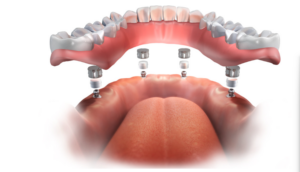
Dentures have long been a popular solution for replacing missing teeth, restoring both function and aesthetics to those who have lost their natural teeth. For properly fitted dentures that ensure optimal comfort and oral health, consult a dentist in Rockville MD. However, not all dentures are created equal, and the fit of your dentures plays a crucial role in your oral health, comfort, and overall quality of life. At Rockville Dental Arts, we understand the importance of properly fitting dentures and want to educate our patients about the risks associated with poorly fitting dentures.
The Importance of a Proper Fit
When dentures fit correctly, they should feel comfortable and secure in your mouth. They should allow you to speak clearly, eat a variety of foods, and smile with confidence. A good fit ensures that your dentures stay in place without the need for excessive adhesives and don’t cause irritation or discomfort to your gums and surrounding tissues.
Risks of Poorly Fitting Dentures
- Oral Discomfort and Pain One of the most immediate and noticeable effects of ill-fitting dentures is discomfort. Dentures that are too loose can rub against your gums, causing sore spots and inflammation. On the other hand, dentures that are too tight can create pressure points, leading to pain and potential tissue damage.
- Difficulty Eating and Speaking Poorly fitting dentures can significantly impact your ability to eat and speak properly. You may find it challenging to chew certain foods, leading to dietary restrictions and potential nutritional deficiencies. Additionally, loose dentures can affect your speech, causing embarrassment and reduced confidence in social situations.
- Oral Infections When dentures don’t fit correctly, they can create spaces where food particles and bacteria can accumulate. This buildup can lead to oral infections such as denture stomatitis, a type of yeast infection that causes inflammation of the tissues beneath the denture.
- Bone Loss and Facial Changes Over time, ill-fitting dentures can accelerate bone loss in your jaw. When dentures don’t provide proper support or distribute pressure evenly, it can lead to faster resorption of the underlying bone. This bone loss can cause changes in your facial structure, potentially resulting in a sunken appearance and premature aging.
- Digestive Issues When you can’t chew your food properly due to poorly fitting dentures, it can lead to digestive problems. Swallowing larger pieces of food can strain your digestive system and potentially cause issues such as indigestion or malnutrition.
- Increased Risk of Choking Loose dentures pose a serious choking hazard. If your dentures frequently slip out of place while eating, there’s a risk they could dislodge completely and obstruct your airway.
- Reduced Quality of Life The cumulative effect of these issues can significantly impact your overall quality of life. You may avoid social situations, limit your food choices, and experience a decrease in self-esteem and confidence.
Signs Your Dentures May Need Adjustment
It’s essential to be aware of the signs that indicate your dentures may need adjustment or replacement:
- Slipping or moving when you eat or speak
- Clicking sounds when you talk or eat
- Difficulty chewing or changes in your bite
- Sore spots or irritation in your mouth
- Bad breath or unusual tastes in your mouth
- Visible staining or wear on your dentures
The Importance of Regular Dental Check-ups
To ensure your dentures continue to fit properly, it’s crucial to maintain regular dental check-ups. At Rockville Dental Arts, we recommend that denture wearers visit us at least once a year for a comprehensive evaluation of their oral health and denture fit.
During these appointments, we can:
- Assess the fit and condition of your dentures
- Make necessary adjustments to improve comfort and function
- Check for any signs of oral health issues
- Provide professional cleaning to remove stains and bacteria
- Discuss any concerns you may have about your dentures
Solutions for Ill-Fitting Dentures
If you’re experiencing issues with your dentures, don’t worry – there are solutions available:
- Denture Adjustments: Minor fit issues can often be resolved with simple adjustments to your existing dentures.
- Denture Relines: This process involves adding new material to the base of your dentures to improve the fit and account for changes in your mouth’s shape.
- Denture Replacements: In some cases, it may be necessary to create entirely new dentures to ensure a proper fit.
- Implant-Supported Dentures: For a more secure and stable solution, we may recommend implant-supported dentures, which anchor to dental implants placed in your jawbone.
At Rockville Dental Arts, we’re committed to helping our patients achieve optimal oral health and comfort. If you’re experiencing any issues with your dentures or are due for a check-up, we encourage you to schedule an appointment with us. Our experienced team of dental professionals in Rockville, MD, is here to provide you with personalized care and solutions tailored to your unique needs.
Remember, properly fitting dentures are essential for your oral health, overall well-being, and quality of life. Don’t let ill-fitting dentures hold you back from enjoying life to the fullest. Contact Rockville Dental Arts today to ensure your dentures are providing you with the comfort, function, and confidence you deserve.
Conclusion
Proper denture fit is essential for your oral health, comfort, and quality of life. Poorly fitting dentures can lead to numerous problems, from discomfort to serious health issues. At Rockville Dental Arts, we’re committed to ensuring our Rockville, MD patients have well-fitting, comfortable dentures. Whether you need adjustments, relines, or replacements, or are considering implant-supported options, our experienced team is here to help. Don’t let ill-fitting dentures hold you back – schedule a check-up with us today and take the first step towards a more comfortable, confident smile.

